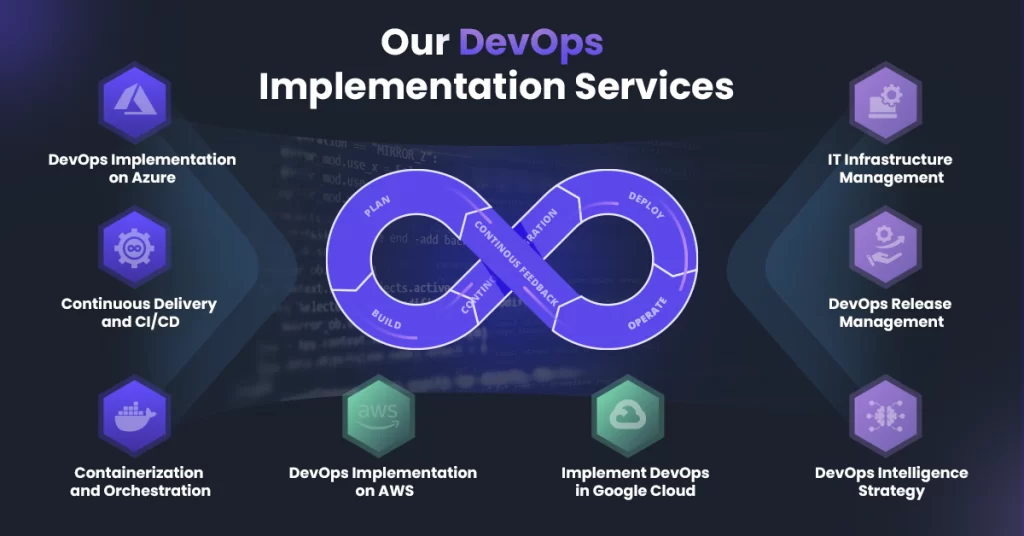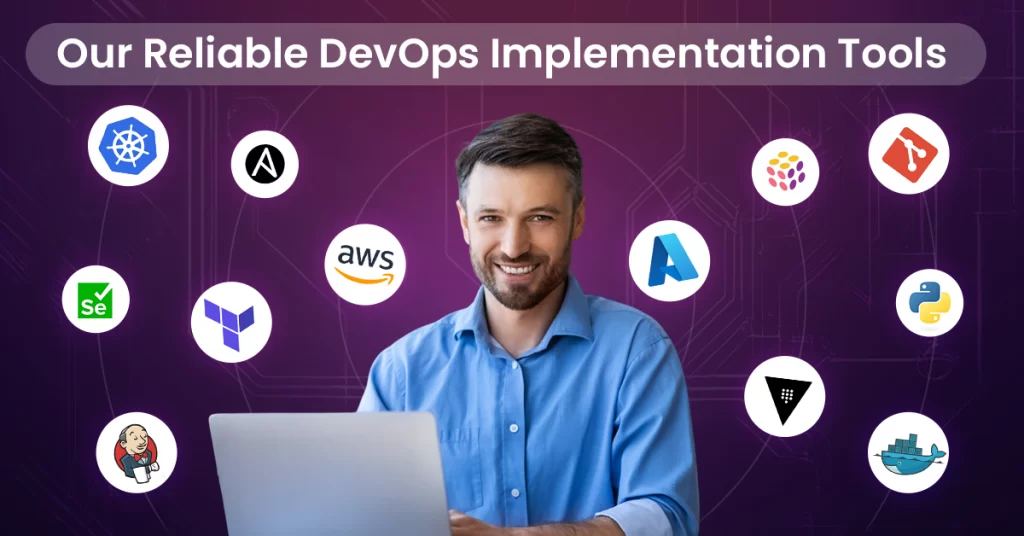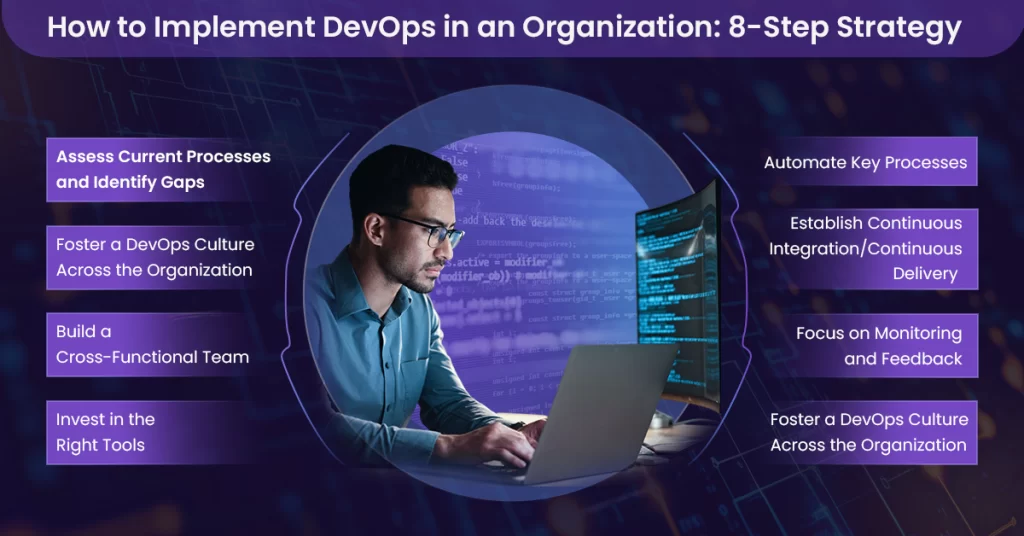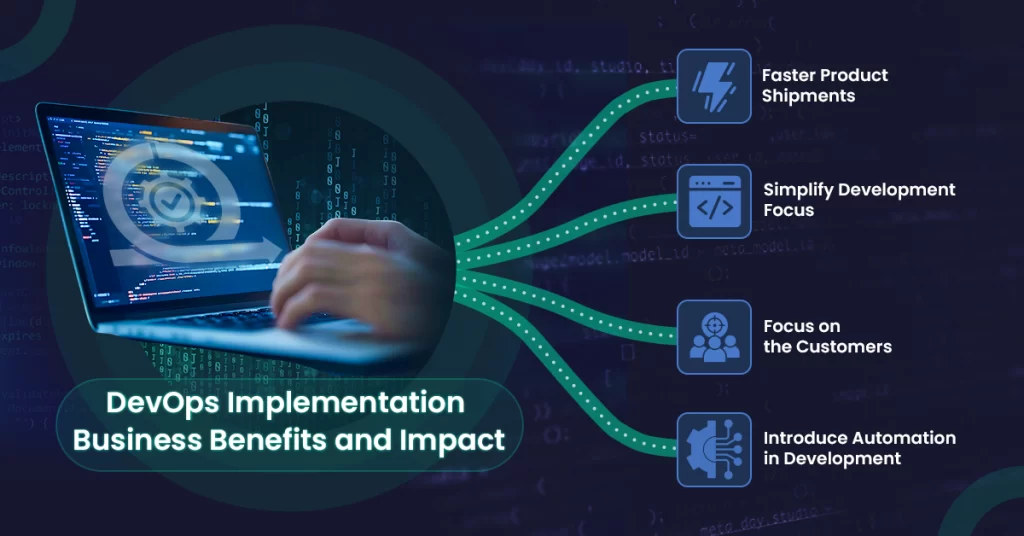DevOps Implementation Services Plan [Steps, Tools & Benefits]

Speed and reliability aren’t just goals—they’re non-negotiables. But how do you achieve both without sacrificing quality?
DevOps holds the answer.
According to a DORA report, teams adopting DevOps practices deploy code 46 times faster and experience five times fewer failures. But what exactly is DevOps, and why does it matter?
More importantly, how can your business use DevOps services to transform software delivery?
In this blog post, we’ll explore these questions and guide you through the steps to implement DevOps practices effectively.
Ready to automate, optimize, and scale? Let’s start reading………….
Table of Contents
How Does DevOps Implementation Help Businesses?
Every business needs speed and reliability to thrive.
DevOps creates a seamless connection between teams, automating processes to reduce delays and errors.
Firms using DevOps implementation plans deploy updates faster, recover quickly, and deliver consistent value.Think of it as a strategy to work smarter, not harder.
Our DevOps Implementation Services

For over 16+ years, Contus Tech has been solving real-world DevOps challenges.
From simplifying workflows to adopting advanced tools, we ensure seamless implementation tailored to your needs.
DevOps problems? We’ve seen them all—and solved them.
Here’s a look at the advanced DevOps Implementation services we offer you to drive efficiency, scalability, and seamless delivery for your business.
➡️ DevOps Implementation on AWS
Leverage the power of AWS to streamline your workflows. From setting up pipelines to managing automated deployments, we build solutions that enhance agility and reduce time-to-market.
➡️ Implement DevOps in Google Cloud
We utilize Google Cloud’s tools to create dynamic CI/CD pipelines, secure environments, and automated scaling, ensuring your applications are always ready to handle demand.
➡️ DevOps Implementation on Azure
Our Azure-based solutions enable seamless integration of tools, automated testing, and rapid deployments. Azure’s DevOps implementation services help us create efficient, secure delivery pipelines.
➡️ Continuous Delivery and CI/CD
By automating the entire build, test, and deployment cycle, we ensure rapid delivery of high-quality software. Our CI/CD pipelines minimize downtime and maximize efficiency.
➡️ Containerization and Orchestration
We help you adopt Docker and Kubernetes for streamlined development and deployment. Containerization improves portability, while orchestration ensures reliable scaling and management of services.
➡️ IT Infrastructure Management
Our team optimizes your infrastructure for performance and cost. With automation at the core, we handle provisioning, monitoring, and scaling so you can focus on your business goals.
➡️ DevOps Release Management
From planning to production, we ensure every release is predictable, efficient, and error-free. Our automated workflows and rigorous testing processes guarantee successful deployments.
➡️ DevOps Intelligence Strategy
We incorporate analytics and monitoring into your DevOps lifecycle. By utilizing intelligent tools, we provide insights into performance, enabling continuous improvement and innovation.
Our Reliable DevOps Implementation Tools

With countless DevOps tools available today, choosing the right one for your business can be overwhelming.
To simplify this process, we’ve curated a list of proven tools tailored for specific purposes.
Explore our toolkit below to find the best fit for your DevOps implementation services.
| Category | Tools | Purpose |
|---|---|---|
| Cloud Platforms | AWS, Google Cloud, Microsoft Azure | Cloud hosting, scalability, and resource management. |
| Infrastructure as Code | Terraform, AWS CloudFormation, Pulumi | Automate infrastructure provisioning and management. |
| Configuration Management | Ansible, Chef, Puppet | Standardize and automate configurations across environments. |
| Security Tools | HashiCorp Vault, SonarQube, Aqua Security | Enhance security in development, build, and deployment processes. |
| Version Control Systems | Git, Bitbucket, GitLab | Manage source code and collaborate effectively. |
| Multi-Cloud Deployment | Docker, Podman | Package applications for seamless deployment in any environment. |
| Orchestration Tools | Kubernetes, Docker Swarm, Apache Mesos | Automate deployment, scaling, and management of containerized applications. |
| CI/CD | Jenkins, GitLab CI/CD, CircleCI | Automate code integration, testing, and deployment workflows. |
| Monitoring Tools | Prometheus, Grafana, ELK Stack | Track system performance, identify issues, and ensure uptime. |
| Test Automation Tools | Selenium, TestNG, JUnit | Streamline and automate software testing processes. |
| Coding & Scripting | Python, Bash, Go, PowerShell | Develop scripts and code for automation and custom workflows. |
These tools form the backbone of our DevOps implementation roadmap, empowering your business to deliver reliable, high-quality software efficiently.
Steps Involved in DevOps Implementation Roadmap & Impact
There are six key steps that you need to follow to implement DevOps successfully. Each step plays a vital role in improving collaboration, speeding up delivery, and boosting efficiency.
So, what does this roadmap look like?
Here’s a quick look at the key stages:
- Introduce DevOps Initiative
- Develop DevOps Strategy
- Use Containerization
- Integrate Infrastructure With CI/CD Tools
- More Test Automation and QA-Dev Alignment
- Application Performance Monitoring
Now that you understand the essential steps in DevOps roadmap and the impact they can have on your business, it’s time to take the next leap.
Moving from planning to execution requires a clear strategy to ensure success.
So, how do you get started with DevOps in your organization?
Just read below in the next 2 minutes to learn more.
How to Implement DevOps in an Organization: 8-Step Strategy

It’s simple, practical, and focused on making your DevOps implementation steps as smooth and impactful as possible.
Let’s get into it.
1️⃣ Assess Current Processes and Identify Gaps
Before diving in, take a look at your current development and operations workflows.
What’s working well?
What’s slowing you down?
Identifying gaps in your existing processes will help you know where to focus your DevOps efforts.
2️⃣ Define Clear DevOps Objectives
What do you want to achieve with DevOps?
Whether it’s faster releases, higher quality, or better collaboration, having a clear goal will guide your strategy.
Define measurable objectives so you can track progress and ensure you’re on the right path.
3️⃣ Build a Cross-Functional Team
DevOps is about collaboration across departments, so it’s essential to build a team that includes both developers and operations staff.
By breaking down silos and getting everyone working together, you can create a more streamlined and efficient workflow.
4️⃣ Invest in the Right Tools
DevOps relies heavily on automation, and that means having the right tools in place. From CI/CD pipelines to monitoring systems, select tools that fit your organization’s needs.
Make sure they integrate well with each other, as a seamless toolset will make the automation process smoother.
5️⃣ Automate Key Processes
Automation is one of the core principles of DevOps. Automate repetitive tasks like testing, deployment, and monitoring.
This reduces human error, speeds up processes, and frees up your team to focus on more strategic tasks.
6️⃣ Establish Continuous Integration/Continuous Delivery
CI/CD is the backbone of DevOps. With continuous integration, developers can merge code changes frequently, while continuous delivery ensures those changes are automatically deployed to production.
This results in faster delivery times and higher-quality code.
7️⃣ Focus on Monitoring and Feedback
Once your DevOps pipeline is running, you’ll need to keep an eye on everything.
Continuous monitoring allows you to catch issues early, and real-time feedback lets you adjust your processes quickly. This keeps everything running smoothly and ensures that any problems are addressed before they become major issues.
8️⃣ Foster a DevOps Culture Across the Organization
Encourage a culture of collaboration, continuous improvement, and shared responsibility.
When everyone in the organization embraces DevOps, the benefits are felt across the board, from development to operations to business leaders.
We have discussed the eight essential steps to implement DevOps—so what benefits can you expect once these steps are in place?
Let’s take a look at what you’ll gain.
DevOps Implementation Business Benefits & Impact

Companies like Netflix, Amazon, and Google are already leveraging DevOps to stay ahead in competitive markets.
The result?
Happier customers, quicker time-to-market, and a development team focused on innovation rather than firefighting.
Let’s break down exactly how the DevOps implementation roadmap delivers these game-changing benefits.
✅ Focus on the Customers
Imagine running an e-commerce platform where downtime costs you thousands every hour.
With DevOps, companies like Amazon prioritize customer satisfaction by ensuring constant system reliability. DevOps fosters quick updates and a seamless user experience.
The focus shifts to customers’ needs: fast, reliable, and hassle-free services.
✅ Faster Product Shipments
Speed is everything.
Consider Netflix—they release updates hundreds of times daily.
DevOps enables continuous delivery pipelines that reduce deployment times from days to hours. Faster product launches mean staying ahead of competitors and keeping customers excited with regular innovations.
✅ Simplify Development Focus
With traditional silos, developers spend more time fixing bugs than building features. DevOps changes this.
Take Google Cloud as an example. By aligning teams, developers focus on innovation while automated monitoring handles the nitty-gritty details.
Simplified focus boosts creativity and efficiency.
✅ Introduce Automation in Development
Think of Tesla’s self-updating vehicles.
Their DevOps-driven systems automate updates, diagnostics, and monitoring without manual intervention.
Automation eliminates human error and accelerates repetitive tasks, ensuring precision while teams tackle bigger challenges
Final Thoughts
DevOps is more than a strategy—it’s the foundation for future-proofing your business.
With automation, AI, and seamless workflows, it’s driving faster innovation and smarter problem-solving.
The process of implementing DevOps might seem like a big undertaking, but the payoff—streamlined workflows, faster deployments, and higher customer satisfaction—is undeniable.
The tools and techniques we discussed are just the starting point.
The real question is, how will your organization use DevOps to stay ahead, adapt, and thrive in a rapidly changing world?
The future is waiting—are you ready to lead it?
Build a more agile, collaborative, and efficient future for your organization. Feel free to connect with us to discuss your specific needs
Frequently Asked Questions about DevOps Implementation(FAQ):
1. What is DevOps?
DevOps is a collaborative approach unifying development and operations teams to streamline software delivery. It emphasizes elements like automation, continuous integration, and continuous delivery. In short, DevOps fosters a culture of collaboration and efficiency.
2. Why Implementing DevOps Is Necessary for an Organization?
DevOps accelerates software development, enhances collaboration, and ensures faster, more reliable software releases. This approach aligns multiple teams, reduces errors, and boosts overall efficiency. DevOps helps organizations and businesses stay competitive in the rapidly evolving technology landscape.
3. How Does DevOps Benefit an Organization?
DevOps enhances agility, reducing the time-to-market and fostering innovation. For example, automation minimizes errors, and continuous feedback loops improve product quality. Similarly, team collaboration promotes a shared responsibility culture, leading to increased efficiency, customer satisfaction, and adaptability to market changes.
4. What Are the Key Components Needed to Implement DevOps Successfully?
Successful DevOps implementation requires a cultural shift, automation tools (CI/CD pipelines), continuous monitoring, collaboration platforms, and a focus on continuous improvement. Training teams, establishing clear communication channels, and aligning organizational goals are crucial for sustained success in DevOps implementation.
5. Can DevOps Be Applied to All Types of Projects and Industries?
Yes, DevOps principles are universally applicable across industries and project types — from software development to IT operations and beyond. DevOps is an evolving technology, and it adapts to varying scales and complexities. Its principles, tools, and practices can be tailored to suit the specific needs of diverse projects and industries, promoting efficiency and collaboration.




Begin with small incremental changes. Assess current workflows, automate repetitive tasks & introduce CI/CD pipelines gradually. A DevOps implementation roadmap ensures minimal disruption while improving efficiency step by step.
Start with automation in testing & deployment. Implement DevOps tools like Jenkins for CI/CD and Terraform for infrastructure automation. Focus on breaking down silos between teams & fostering a collaborative DevOps culture.
Netflix is a great example—by implementing DevOps, they release updates daily without service interruptions. Automated deployments, monitoring & feedback loops have made their platform more reliable & scalable.
What challenges should I anticipate when implementing DevOps and how do I overcome them?
Resistance to change, tool complexity & cultural silos are common challenges. Overcome them by training teams, using a phased implementation approach & focusing on automation and collaboration to drive adoption.
How can I measure the success of DevOps implementation?
Track metrics like deployment frequency, lead time for changes, mean time to recovery (MTTR) & system uptime. A well implemented DevOps approach should result in faster releases, fewer failures & higher efficiency.
What’s the best DevOps implementation plan for scaling applications?
Adopt microservices, containerization & Kubernetes orchestration. Automate infrastructure management using Terraform and scale efficiently with cloud-based auto scaling solutions. Continuous monitoring ensures performance optimization.
How does DevOps implementation improve software delivery speed?
DevOps automates testing, deployment & monitoring. With CI/CD pipelines, code moves from development to production seamlessly. This eliminates manual bottlenecks reducing deployment times from weeks to hours.
What’s the role of containerization in DevOps implementation?
Containerization (Docker, Kubernetes) simplifies DevOps implementation by making applications portable & scalable. It ensures consistency across environments, allowing faster deployments & efficient resource utilization.
How can I implement DevOps in cloud platforms like AWS, Azure or Google Cloud?
Use cloud-native DevOps tools like AWS CodePipeline, Azure DevOps or Google Cloud Build. Automate deployments, infrastructure provisioning and monitoring to enhance speed and reliability in cloud environments.
Results can vary but many organizations will see the initial improvements in a very few months especially with the CI/CD pipelines. Full benefits like streamlined workflows and enhanced collaboration may take 6-12 months. The key is consistent effort.
Common challenges include cultural resistance, lack of expertise and fragmented processes. Overcoming them by fostering a collaborative culture, investing in DevOps training and gradually automating the processes. Starting small and scaling up will helps to build the momentum for successful DevOps implementation.
Signs can include a need for faster delivery cycles, frequent deployment issues or siloed teams. If you’re facing these it’s the time to move for DevOps implementation services to streamline processes, improve collaboration and accelerate releases.
Start with a complete assessment of your current workflows. Identify the bottlenecks and areas ripe for automation. Establish a dedicated DevOps team to lead the charge & kick off with CI/CD practices to build momentum. Gradually scale up from that position.
It’s important! A dedicated team will ensures the focused efforts on DevOps practices from automating pipelines to fostering cross team collaboration. They champion the culture shift needed for successful implementation & help to sustain for long term DevOps success.
CI/CD pipelines are the backbone of DevOps which will enable the frequent automated code integration and deployment. They improve the agility, reduce manual errors and ensure faster delivery cycles by making them essential for effective DevOps implementation.
Automation is a central to DevOps. It reduces errors, speeds up deployments and frees up teams to focus on innovation. Automating testing, deployment and monitoring are key steps in successfully implementing DevOps and ensuring consistent results.
Monitor key metrics like deployment frequency, lead time for changes and failure rates. Regular feedback loops & performance dashboards help you to track the progress, identify areas for improvement and refine your DevOps implementation strategy.
You can certainly start on your own especially with a skilled team. However DevOps implementation services offers expertise, streamlined processes and tools that can accelerate adoption, avoid pitfalls and maximize the benefits of DevOps in your organization.